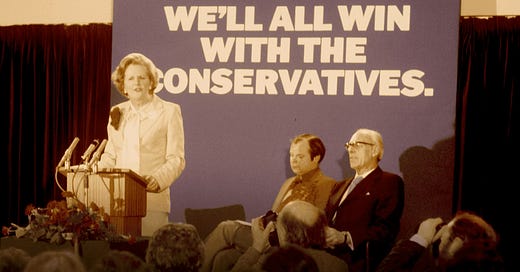Conservatism is enjoyment.
-Walter Bagehot
Are conservatives stupid? Is conservatism inherently anti-intellectual?
Thinkers on both the political right and left have often bewailed the absence of conservative political theory, by which they typically mean that conservatism - unlike, say, liberalism, libertarianism, Marxism, feminism, fascism, and the like - does not consist of a body of abstract explanations for why politics takes the form that it does, predictions about how it will develop, or idealised sets of reasoned ends.
Writing in the 1950s, Lionel Trilling derided the tendency for conservatives ‘not to express themselves in ideas’ but only ‘in action or in irritable mental gestures which seek to resemble ideas’. Ted Honderich, in the 1990s, meanwhile complained about the tendency of conservatives to ‘make a virtue of not trying’ to come up with proper theoretical positions. FJC Hearnshaw seemed to take this as a blessing. ‘Ordinarily,’ he said, ‘it is sufficient for the conservative to sit and think, or perhaps merely to sit.’
The reason for this is not, I think, so complicated at the level of motivation. Why does anybody want to conserve anything? Because, definitionally, they don’t particularly want it to change. There is therefore no real need to theorise that thing, unless its legitimacy or ongoing existence is threatened and a justification is therefore needed for it. This contributes to making conservatism what Samuel Huntingdon called ‘situational’ - it is a reaction against what is considered to be unnecessary or too-rapid change. If such change is not in the offing, conservatives go into quiescence and stop thinking about why they value what they value. If such a change threatens, they resist that change and think up reasons why it is bad.
But there is also something important about conservatism that differs from other political impulses or movements: conservatism is above all a practice. It does not consist of explanations so much as it inhabits forms of life. Family, marriage, community, religious ceremony, and even more diffuse practices such as the speaking of a traditional dialect or the continuation of old cultural activities (Guy Fawkes’ Night; the Sunday roast; buying a round at the pub; etc.) - this is what conservatism really consists of and where it finds expression. Conservatives are, in other words, ‘not to make reply or reason why’ - they are to do (and in the end, I suppose, die).
This perhaps makes conservatism more aptly labelled dispositional than situational. It is about contentment. To resort to Michael Oakeshott, to be a conservative:
is to prefer the familiar to the unknown, to prefer the tried to the untried, fact to mystery, the actual to the possible, the limited to the unbounded, the near to the distant, the sufficient to the superabundant, the convenient to the perfect, present laughter to utopian bliss.
‘Present laughter’ is not something that one has to think about very hard. And nor indeed should one, for devoting too much thought to ‘present laughter’ kills it. One simply enjoys it. One inhabits the moment and gets lost in it.
The essence of conservatism in other words is to treasure and enjoy the familiar things that one loves and values. This is not the outcome of theory but feeling. And conservatism is therefore best understood as mode of living rather than a reasoned philosophy or theory - it is what we naturally do when we can see that what is around us, and the place from which we have come, is fundamentally good (or at least better than any alternative). This can be conservatives’ worst quality (what Bagehot described as the complacent conclusion that ‘all of existence is summum bonum’) but it also, at the same time, their best.
This helps to explain why it is that theorising, particularly in the abstract, does not come naturally to conservatives, and why it is that there is, to be sure, comparatively little formal academic conservative political philosophy. It might even be said that theory is intrinsically unconservative in that - to return again to Oakeshott - to theorise something is to submit it to the ‘crucible of the intellect’. And as there is nothing that can ultimately survive passing through that crucible, since everything in the end will melt under the heat of concerted intellectual analysis, this is tantamount to saying that the process is simply hostile to the preservation of any and all traditions, norms, values, or even ideas. This is what, after all, three generations or more of anti-foundational theorists have demonstrated: what indeed is postmodernism but the endpoint of the intellectual endeavour, at which literally every aspect of the human experience has been deconstructed into less than the sum of its parts, and where nothing remains but the bleakest nihilism?
(One thinks here of Turgenev’s Yevgeny Bazarov, from Fathers and Sons, a self-described nihilist, who cannot see a frog for what it is, or value it, and chooses only to dissect it into inert and ugly biological fragments. This is the same metaphor, oddly enough, which CS Lewis used, in Perelandra, to describe the essence of ‘whole-hearted’ evil.)
Conservative intellectualism, then, does not tend to manifest itself in theory, at least in the sense which I earlier described it. But that is not to say that it does not exist. It certainly does exist - but its aims tend to be more concrete and its operations too closely entwined or embedded in a particular context to describe it as political ‘theory’. We can see it appearing in three different guises.
Keep reading with a 7-day free trial
Subscribe to News from Uncibal to keep reading this post and get 7 days of free access to the full post archives.




